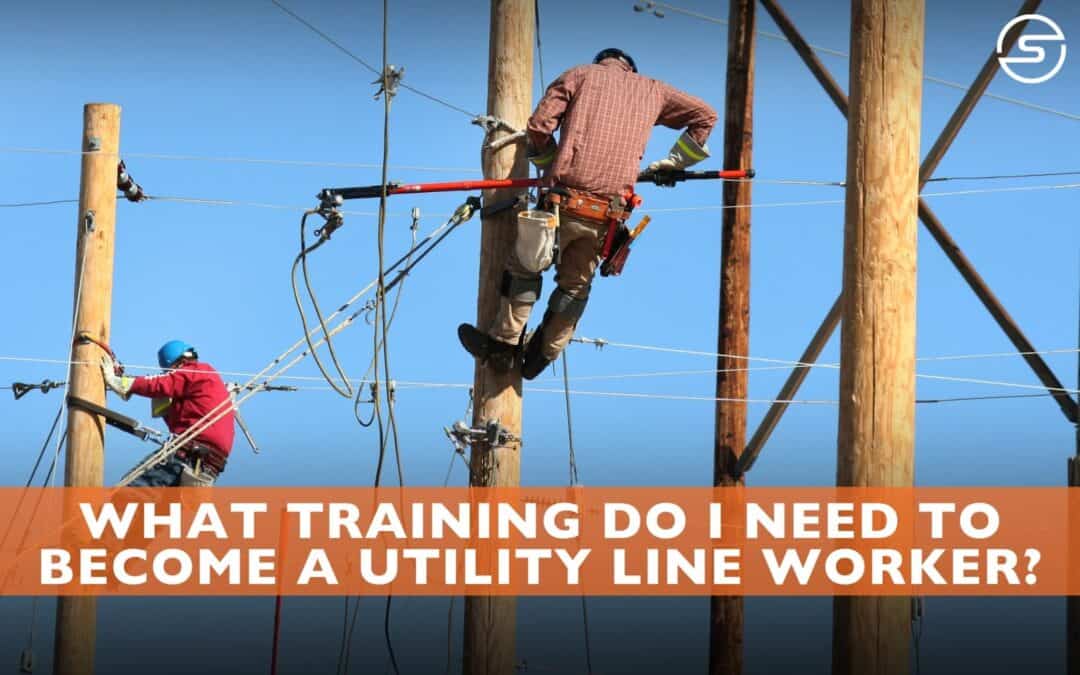Are you looking for a career that is both physically and mentally challenging? Would you rather work outdoors than in a stuffy office? Do you want a job that makes a real difference in people’s daily lives? Becoming a utility lineman may be the perfect fit for you. Although it is a tough job, it can be extremely rewarding financially, professionally, and personally.
To become a journeyman line worker, you will have to gain considerable knowledge and skills in all the tasks that line workers need to perform. Some can be acquired by schooling, but some can only be achieved by performing. Let’s look at some basic training you will need to become a utility line worker.
Fitness
Before considering this career, recognize that utility linemen must be physically fit. You will need to lift and carry tools and equipment and must be able to climb power poles with all your gear. Line worker gear is highly specialized for working with electricity and can be heavy: dielectric gloves and boots, hard hats, and loaded tool belts. Although there are times when you will be working out of a bucket truck, that is not always the case. In addition, you must be comfortable working at heights and sometimes working for extended periods in extreme weather conditions, so having physical stamina is a must.
Since this job consistently requires workers to stay fit, it is only for people willing to dedicate themselves to a regular exercise routine, eating right, and getting proper sleep. The job cannot be performed safely by people who are not alert and sharp-minded when on the job, even when the job requires being called out at night in a storm to repair a downed line.
Education
A college degree is not required to get a job as a utility worker, although it can be helpful. But even if you do not have a college degree, you will need some education. In addition to your high school diploma or a GED, you will need to take some trade classes. Some community colleges offer these, but there are also lineman colleges that offer the necessary courses. Some utilities even provide these classes in-house for apprentice line workers. These classes focus on understanding the different equipment used in a power grid, the problems that can arise with equipment, trouble-shooting systems, and components, how to repair faulty, failed, or broken equipment, how to use the various tools of the trade, and critical safety training.
Training in the Field
Even when you undergo trade education at a trade school or college, you must be accepted as an apprentice at a utility to get the necessary training in the field. The good news is that this position is usually paid. To earn your pay, you must support and assist line workers as you learn on the job.
The length of lineman training varies depending on the employer and your education and experience. Generally, it takes about three to four years of fieldwork (often measured by hours in the field) to become a fully qualified lineman able to work directly on electrical equipment. You must complete the required classes and demonstrate your competence during this time. The utility company will likely require you to pass several tests demonstrating your physical fitness and practical knowledge, including understanding safety practices.
Licensing
Licensing requirements vary by state; some require them at both the apprentice and the journeyman stage. Most states require that you obtain a state license by passing an exam and providing proof that you have completed a certain number of hours of field training. You will also have to pay a license fee. Other states do not have a state licensing requirement but may require licensing at the municipal level. You will need to determine the requirements for any state or municipality you plan to work in.
In addition to professional licensing, most linemen will need to obtain a Commercial Driver’s License (CDL) to operate the different types of vehicles used by utility companies.
Find Out More About Becoming a Lineman
The steps outlined above give you the basics. If you want to become a line worker, call your local utility company for their recommendations about how to get started. The path forward does not require you to spend years at college, and, what is more, you will have an opportunity to earn a living as you train to become a journeyman line worker. The skills and knowledge you acquire will be useful and valuable, even if you decide to branch out into another line of work.
The financial rewards of working in this profession can be substantial. For a start, you will avoid student loan debts and gain financial independence soon. Your job will always be in demand, regardless of the economy. There is a need for more line workers in the United States, which means you will easily find a job almost anywhere. If you are willing to travel, you can substantially enhance your income by responding to national disasters like hurricanes, tornadoes, and floods.
You also can pursue a specialization. With technological advancements and increased demand for renewable energy sources, linemen are now responsible for maintaining and repairing power lines and equipment for solar farms, wind turbines, and other alternative energy sources.
Becoming a utility lineman is no easy task and takes years of training; it requires dedication and hard work. At Safeguard Equipment®, we build products designed to protect line workers from the dangers of working around high-voltage lines. We have tremendous respect for line workers, and it is our mission to make sure they can do their jobs safely and effectively so that they can return home to their families at the end of the work day. Call Safeguard Equipment today to learn more about how we help to keep line workers safe.
Views: 57

